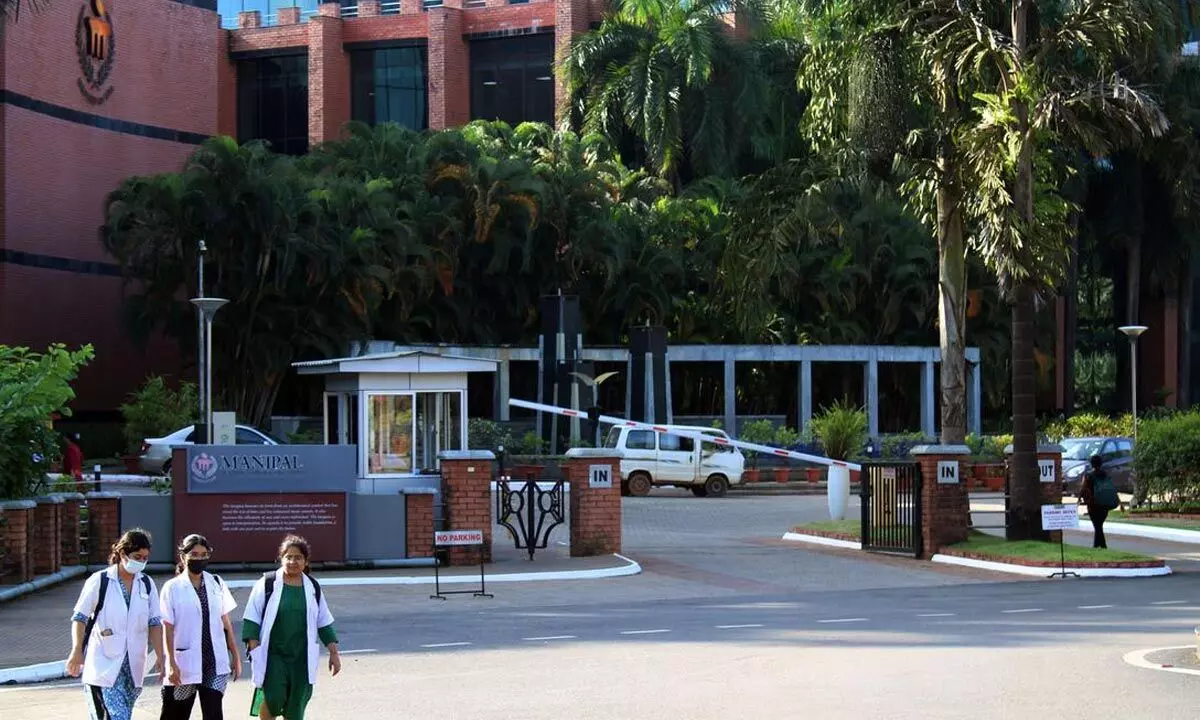Live
- Kerala LoP Satheesan urges CM Vijayan to pass resolution against draft UGC regulations
- Human Trafficking Awareness Day 2025: History, Significance, and Theme
- Hrithik Roshan reflects on legacy and inspiration
- Dhivyabharathi promises an unforgettable experience with ‘Kingston’
- India remains a bright spot in global GDP growth trajectory: Economists
- Director Kiruthiga Udhayanidhi encourages actors to embrace bold roles
- ‘Fateh’ review: Feast to action lovers
- Samantha overcomes health setbacks; shares updates on social media
- Kejriwal swindled Rs 2,026 cr through liquor scam, shows CAG report
- Angola reports 119 cholera cases, including 12 deaths
Just In
A Silent Threat to Male Reproductive Health: New Study Raises Concerns About Common Herbicide Clethodim

In a significant new collaborative effort, researchers from Kasturba Medical College, Manipal Academy of Higher Education, Manipal, and Yenepoya Research Center, Mangalore
In a significant new collaborative effort, researchers from Kasturba Medical College, Manipal Academy of Higher Education, Manipal, and Yenepoya Research Center, Mangalore, have unveiled alarming insights into the potential impact of the widely used herbicide clethodim on male reproductive health. The findings, recently published in the esteemed journal "Chemosphere", highlights the risks associated with clethodim-based herbicide exposure on male reproductive function and early embryonic development. The study utilised laboratory mouse model to explore the consequences of clethodim exposure. The results of this study have raised significant concerns about male reproductive health, revealing a spectrum of effects including a reduction in testicular weight, a decrease in germ cell population, lower levels of serum testosterone, abnormalities in sperm, and compromised preimplantation embryo development.
Dr. Guruprasad Kalthur, the principal investigator and expertin fertility and reproductive science at Kasturba Madical College, Manipal, stressed the importance of their discoveries: "Although clethodim has been an approved herbicide for some time, our study unveils previously uncharted repercussions on male reproductive health and the early stages of embryonic development. These findings necessitate further investigation and thoughtful reconsideration of the use of such herbicides to ensure the wellbeing of both humans and our environment." Supporting this standpoint, Dr. Keshava Prasad, Professor and Deputy Director, Centre for Systems Biology and Molecular Medicine at Yenepoya Research Center, Mangalore, emphasized the necessity of molecular-level screenings to comprehend the potential effects of herbicides on human and environmental health. Dr. Satish Kumar Adiga, Head, Centre of Excellence in Clinical Embryology at Kasturba Medical College, further highlighted the worrisome connection between environmental pollutants and compromised sperm function – a pressing concern in recent years.
Herbicides play an essential role in bolstering human prosperity and are integral to our modern way of life. Given the widespread use of mice as vital mammalian models in health research, the outcomes of this study hold significant implications for stakeholders across various fields. The study's co-author, Dr. Nagarajan (Raj) Kannan, a distinguished expert in stem cells and cancer from Mayo Clinic, USA, underlined the urgency of comprehensive testing for this post-emergent herbicide, revisiting its application when possible, and advocating for upgraded standards in the formulation of new agents for similar uses.
Dr. Padmaraj Hegde, Dean of Kasturba Medical College, extended congratulations to the research team and underscored the pivotal role of such studies in enhancing the reproductive health of forthcoming generations. Dr. Sharath Rao, the Pro Vice Chancellor of Health Sciences at Manipal Academy of Higher Education, emphasized that this study paves the way for future research aiming to understand the broader repercussions of clethodim exposure across various species, including humans. Lt. Col. Dr. Venkatesh, Vice Chancellor of Manipal Academy of Higher Education, highlighted the significance of studies like this in steering well-informed decisions regarding herbicide use in agriculture, landscaping, and other applications, with a strong focus on preserving human health and the environment.
This important research underscores the necessity for heightened awareness and rigorous examination of the implications of clethodim-based herbicides on male reproductive health. The findings warrant reevaluating the use of such herbicides to ensure the health and safety of both humanity and our environment. Through continued research and informed decision-making, we can pave the way for safer agricultural practices and a healthier future for all.
The research was a collaborative endeavor involving experts from various distinguished institutions, including Reyon Dcunha, Sandhya Kumari, Keerthana Sandesh Suvarna, Ananda Hanumappa, Sneha Guruprasad Kalthur, and Satish Kumar Adiga from KMC Manipal, as well as Sadhana Mutalik, Srinivas Mutalik from MCOPS Manipal, Rajanikant GK from NITC Calicut, Mohd Altaf Najar, Anjana Aravind, Shamaprasad Varija Raghu from Yenepoya Research Center, Mangalore, and Sazada Siddiqui, Sulaiman Alrumman, Saad Alamri from King Khalid University, Abha, KSA. Nagarajan Kannan from Mayo Clinic, Rochester, MN, USA, also contributed significantly to this collaborative effort.

© 2025 Hyderabad Media House Limited/The Hans India. All rights reserved. Powered by hocalwire.com






